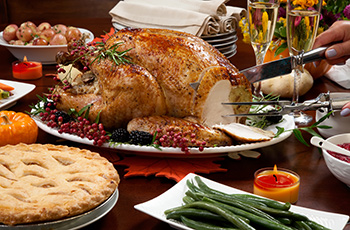
Hooray—the holidays are here! While the season brings a lot of joy, it also ushers in plenty of food, and that can mean greater opportunity for acid reflux or heartburn.
While occasional heartburn isn’t something to worry about, frequent symptoms could signal a more serious problem known as gastroesophageal reflux disease (GERD) or acid reflux.
Before digging into how to prevent that post-meal “bonfire in your chest,” let’s take a quick look at the difference between heartburn and GERD:
Heartburn vs. Acid Reflux (GERD)
Heartburn (a mild to moderate sensation of burning or pain in your chest) is a symptom of GERD/acid reflux. The sensation of burning is generally felt in the upper and central part of the chest, just behind the breast bone. With GERD, the burning sensation is caused when stomach acid reaches the esophagus. However, not everyone with GERD has heartburn. Other signs and symptoms may include:
- Difficulty swallowing
- Regurgitation of food or sour liquid
- Feeling as if there is a lump in your throat
- Nausea
- Hoarse voice
- Coughing, wheezing or frequent throat clearing
8 Tips to Wrap Up That Burn
While about 40 percent of Americans are affected by GERD during their lifetime, symptoms and discomfort associated with the condition (whether it’s the holidays or any time of year) can be minimized by practicing these tips:
- Avoid trigger foods at the buffet. Common heartburn culprits include chocolate, peppermint, fatty or fried foods, and raw onions and garlic.
- Control portions. Large meals can lead to indigestion, so aim to eat smaller meals throughout the day, and pass on second helpings.
- Toast in moderation. Alcoholic beverages, caffeinated beverages and carbonated drinks can bring on acid reflux.
- Go for a walk outside instead of stretching out in front of the TV after that feast. The simple act of lying down or being more horizontal can spark heartburn.
- Kick the cigarette habit. People who smoke are more likely to suffer from erosive esophagitis (wearing away of the lining of the esophagus).
- Sidestep stress. It’s the most wonderful (and hectic) time of year! Remember to take good care of yourself by making time to relax. Try yoga or meditation to soothe the “holi-daily” grind.
- Wear looser-fitting clothing. (Keep in mind: Comfy attire is not a green light to overeat.)
- Take your heartburn or acid reflux meds — whether prescription or over-the-counter (OTC) — as needed/directed.
- Try not to eat or drink within 2 hours of going to bed.
If you’re finding it’s impossible to get the heartburn relief you deserve, talk to your doctor. Without treatment, chronic acid reflux can cause other serious health problems, such as esophageal bleeding, ulcers and Barrett’s esophagus.
You can also learn more about GERD from Holland Hospital's Reflux Center. Dedicated to enhancing your comfort and peace of mind, this Center’s team includes gastroenterology surgeons, gastroenterologists, ENT physicians, registered nurses, a reflux nurse navigator and other professionals specializing in digestive health.